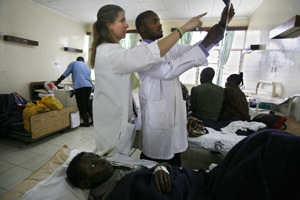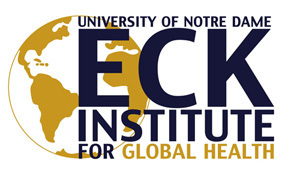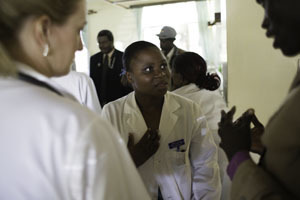
The University of Notre Dame’s Eck Institute for Global Health is now a full member of the Academic Model Providing Access to Healthcare (AMPATH) Consortium, led by Indiana University.
The Consortium works in collaboration with Moi University School of Medicine and Moi Teaching and Referral Hospital in Eldoret, Kenya to help build the care, education and research capacity of these institutions with the goal of providing access to health care for all persons throughout western Kenya. The Eck Institute will serve as the central coordinating body for Notre Dame activities within the AMPATH Consortium.
Notre Dame will specifically be involved in this partnership to expand the basic science research capacity at Moi University School of Medicine. Notre Dame has a unique niche in the Consortium in that it is the only member not focused on clinical care and brings a history of expertise in vector control and tropical disease research.
Notre Dame scientists are excited to participate in the partnership knowing they bring a history of experience and global leadership in the fight against tropical diseases including leishmania, malaria, dengue fever and lymphatic filariasis in addition to communicable diseases, tuberculosis and Ebola.

“The University of Notre Dame is committed to the ideals and goals of the existing partnership," said David Severson, the Eck Institute’s director. "We hope to bring our unique faculty and facility resources to the consortium to expand our research opportunities on the African continent and to bring Kenyan researchers to campus for academic exchange and collaboration. We strongly believe that lab to field research partnerships are critical to the institute’s mission.”
The Eck Institute will lead and coordinate research and training activities for Notre Dame that address constraints to health care in western Kenya, and simultaneously contribute to building scientific research capacity. Joint research activities, participation in seminars and academic meetings, student and faculty exchanges, and special short-term courses will be used to advance the mission of the Consortium. Members of the partnership are committed to observance of equity and mutual respect with a desire of common values resulting in maximum benefit for all involved.
The AMPATH Consortium is comprised of Brown University, Duke University, Indiana University, Lehigh Valley Health Systems, Providence Portland Medical Center, Purdue University, University of Utah, University of Toronto and now the University of Notre Dame.
In 1989, Indiana University School of Medicine and Moi University School of Medicine agreed to join together to develop leaders in health care for both the U.S. and Africa. That mission inspired this team to provide invaluable training to future generations of health care providers on both continents.

At the turn of the century, in the face of the deadliest pandemic in human history, Indiana University and Moi University responded by creating one of Africa’s largest, most comprehensive and effective HIV/AIDS control systems. This system is now expanding its scope to include delivery of essential primary care services and control of communicable diseases and non-communicable, chronic illnesses. The AMPATH Consortium in collaboration with Moi University, Moi Teaching and Referral Hospital, and the Kenya Ministry of Health delivers health services in more than 60 hospitals and clinics in rural and urban western Kenya, serving a population of 3 million people.
“As one of the premier universities in our nation with an outstanding commitment to health equity and a distinguished record of research in neglected tropical diseases, the University of Notre Dame complements the strengths of the other institutions in the AMPATH Consortium,” reported Bob Einterz, M.D., director of the AMPATH Consortium and the IU Center for Global Health. “My Kenyan and American colleagues and I welcome the students and faculty members of the University of Notre Dame, and we look forward to working with them to solve many of our world’s most vexing health problems.”